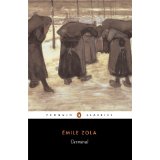One of the ten greatest novels in the French language?
 That was Gide’s view of Émile Zola’s 1885 novel, Germinal. And what a stupendous work it is. I read the Penguin edition in an excellent translation by Roger Pearson. (Alas my French couldn’t cope with this 532 page novel with its complex – though always accessible – descriptions of mining technology). It tells the story of the arrival of a young unemployed railway worker who arrives at Le Voreux mine in northern France, becomes a miner, takes up socialist ideas, and leads a strike. The living and working conditions of the miners and their families are degrading, their poverty extreme, and yet there is a vitality about them which prevents Germinal from being a gloomy read, in spite of the terrible events that transpire. The unbridled sexuality of the young people, some really still children, is described in a way that would have totally impossible in an English novel of the time and there is much that shocks even today.
That was Gide’s view of Émile Zola’s 1885 novel, Germinal. And what a stupendous work it is. I read the Penguin edition in an excellent translation by Roger Pearson. (Alas my French couldn’t cope with this 532 page novel with its complex – though always accessible – descriptions of mining technology). It tells the story of the arrival of a young unemployed railway worker who arrives at Le Voreux mine in northern France, becomes a miner, takes up socialist ideas, and leads a strike. The living and working conditions of the miners and their families are degrading, their poverty extreme, and yet there is a vitality about them which prevents Germinal from being a gloomy read, in spite of the terrible events that transpire. The unbridled sexuality of the young people, some really still children, is described in a way that would have totally impossible in an English novel of the time and there is much that shocks even today.
I read the accounts of the conditions underground with special interest because my father’s father was a miner in the West Riding in the twenties and thirties. Of course by then women and children were no longer working underground as they are in Germinal and there had been technological advances, but the basic conditions were essentially the same and it was still dangerous, filthy, back-breaking work in often suffocating heat.
Zola was already a hero of mine for his intervention in the Dreyfus affair and his ‘J’Accuse’ letter that sent him into temporary exile in England. This book has confirmed my view of his status. After his death in 1902 around 50,00 people, including a delegation of miners, followed his coffin, chanting ‘Germinal! Germinal! Germinal!’, a amazing and moving tribute.
As a postscript, I wonder what would the other nine greatest books be? I haven’t read enough to make an informed decision, but Proust’s À la recherche du temps perdu would have to be one, Flaubert’s Madame Bovary, something by Balzac and Stendal, and Camus’s The Plague. Also Les Liaisons Dangereuses? Suggestions welcome.
2 Comments
moira @ClothesInBooks
September 12, 2015Oh dear. I read Germinal 30 years ago, after hearing it serialized on Radio 4, and found it rather hard going, so it stands in my mind as being a worthy book that I’m glad I read but won’t pick up again…perhaps if I read it now I would like it better. I wanted so much to like it, because – like you – I admire him so much. (I thought he might be the last author in my alphabetically-arranged books, but Stefan Zweig comes after him.)
Great French books – agree with yours. I do have a soft spot for the Count of Monte Christo. I’ll have to think….
Christine Poulson
September 12, 2015Oh, yes, The Count of Monte Christo! I think that was the first adult book I read. I must have been about nine. So thrilling. I think you might feel differently about Germinal now, but I am not going to suggest you reread it: it is such an investment of time.